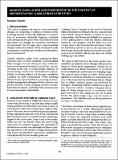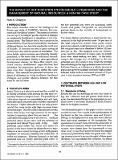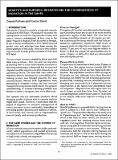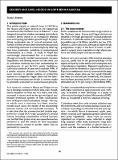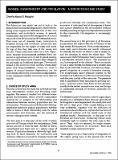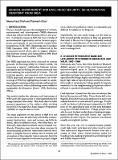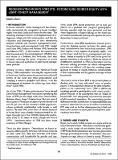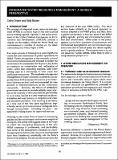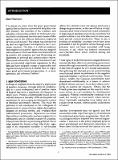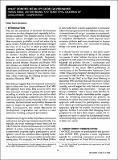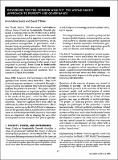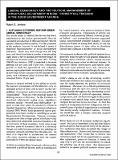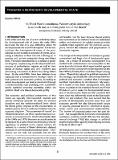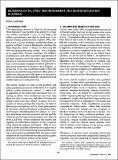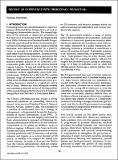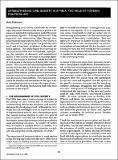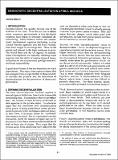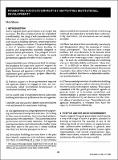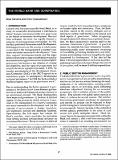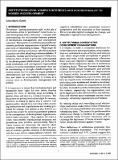Volumes 21 - 30: Getting Institutions Right for Women in Development: Recent submissions
Now showing items 221-240 of 444
-
GENDER, POPULATION AND ENVIRONMENT IN THE CONTEXT OF DEFORESTATION: A MALAYSIAN CASE STUDY
(Institute of Development Studies, 01/01/1995)Summary This article examines the impact of environmental change on competing livelihood systems in the Limbang District of Sarawak, Malaysia. Natural resource?dependent systems like those of upstream Penan and Kelabit ... -
THE IMPACT OF OUT?MIGRATION ON HOUSEHOLD LIVELIHOODS AND THE MANAGEMENT OF NATURAL RESOURCES: A KENYAN CASE STUDY
(Institute of Development Studies, 01/01/1995)Summary This article addresses some key issues relating to the management of household and natural resources within a situtuation of declining natural resource availability in Embu District, Kenya. The article examines ... -
BENEFITS AND BURDENS: RESEARCHING THE CONSEQUENCES OF MIGRATION IN THE SAHEL
(Institute of Development Studies, 01/01/1995)Summary This article is based on research which studied the consequences of out?migration from rural areas of the Sahel for women and environmental management. Research findings show that, although it may lead to an ... -
GENDER AND LIVELIHOODS IN NORTHERN PAKISTAN
(Institute of Development Studies, 01/01/1995)Summary The agro?pastoral system in the mountains of Hunza and Nagar in Northern Pakistan is under severe pressure. Basic conditions are difficult (cultivation is on steep slopes formed of friable rock and scree, and ... -
WOMEN, ENVIRONMENT AND POPULATION: A MOROCCAN CASE STUDY
(Institute of Development Studies, 01/01/1995)Summary This Moroccan case study set out to look at the impact of environmental degradation (chiefly diminishing water supply and deforestation) on the population, and particularly women, of two sub?districts within the ... -
GENDER, ENVIRONMENT AND LIVELIHOOD SECURITY: AN ALTERNATIVE VIEWPOINT FROM INDIA
(Institute of Development Studies, 01/01/1995)Summary Using a case study from India, this article examines the limitations of populist ecofeminist thought. The case study shows that both men and women assume interchangeable roles as destroyers and conservers of the ... -
REGENERATING INDIA'S FORESTS: RECONCILING GENDER EQUITY WITH JOINT FOREST MANAGEMENT
(Institute of Development Studies, 01/01/1995)Summary Among its basic objectives, the Indian National Forest Policy, 1988, emphasizes ‘meeting the requirements of fuelwood, fodder, minor forest produce and small timber of the rural and tribal populations’ and ‘creating ... -
INTEGRATED WATER RESOURCES MANAGEMENT: A GENDER PERSPECTIVE
(Institute of Development Studies, 01/01/1995)Summary The concept of integrated water resources management (WRM) is currently high on the international policy making agenda and has gained momentum as an approach important from both economic and environmental viewpoints. ... -
Introduction
(Institute of Development Studies, 01/04/1995) -
What Donors Mean by Good Governance: Heroic Ends, Limited Means, and Traditional Dilemmas of Development Cooperation
(Institute of Development Studies, 01/04/1995)Summary Growing concerns about the effectiveness of traditional aid policies have motivated donors to extend the agenda on development co?operation, by explicitly dealing with participation and governance. The donor ... -
Governing for the Common Wealth? the world Bank's Approach to Poverty and Governance
(Institute of Development Studies, 01/04/1995)Summary Two important policy initiatives which the World Bank has been promoting since 1989, good governance and poverty reduction, represent an important policy opportunity – to enhance the accountability of governments ... -
Liberal Democracy and the Political Management of Structural Adjustment in India: Conceptual Tensions in the Good Government Agenda
(Institute of Development Studies, 01/04/1995)Summary Why has India been able to sustain for four years an economic reform programme that many had predicted would fall prey to the realities of political competition in a democracy? The answer to this question reveals ... -
Towards a Democratic Developmental State
(Institute of Development Studies, 01/04/1995)Summary The author assesses different views on the relationship between democracy and development in the context of the new democracies of the developing world and concludes that effective developmental performance is ... -
Dilemmas of Military Disengagement and Democratization in Africa
(Institute of Development Studies, 01/04/1995)Summary This article contends that one of the first tasks of new African democracies is to bring military establishments under democratic control. Although it might seem armies are now in retreat from politics, this has ... -
Recent us Experience with Democracy Promotion
(Institute of Development Studies, 01/04/1995)Summary Since the mid ? 1980s the US government has devoted everincreasing resources to assistance programmes aimed at promoting democracy in other countries. Aspects of this assistance currently under debate include how ... -
Strengthening Civil Society in Africa: the Role of Foreign Political Aid
(Institute of Development Studies, 01/04/1995)Summary Strengthening civil society through the provision of financial resources and technical assistance is viewed by aid donors as an effective means of fostering political pluralism and consolidating fragile democracies ... -
Democratic Decentralization in Africa and Asia
(Institute of Development Studies, 01/04/1995)Summary This article summarizes recent research on one of the developmental fashions of our time ? democratic decentralization. After discussing various definitions of ‘decentralization’, it surveys the benefits that can ... -
Promoting Good Government by Supporting Institutional Development?
(Institute of Development Studies, 01/04/1995)Summary Positive support to better government requires aid agencies mainly to engage in ‘institutional development’, or ‘institution building’ activities. The article discusses four sets of problems that arise for aid ... -
The World Bank and Governance
(Institute of Development Studies, 01/04/1995)Summary The Bank's role in assisting developing countries improve their governance has been growing rapidly in recent years. Unlike bilateral donors, who increasingly are conditioning aid on civil and political rights and ... -
Institutionalizing Women's Interests and Accountability to Women in Development
(Institute of Development Studies, 01/07/1995)Summary The Editorial introduces the Bulletin by outlining current approaches to analysing institutions and organizations as gendered terrains and processes. These approaches can help explain persistent difficulties in ...

